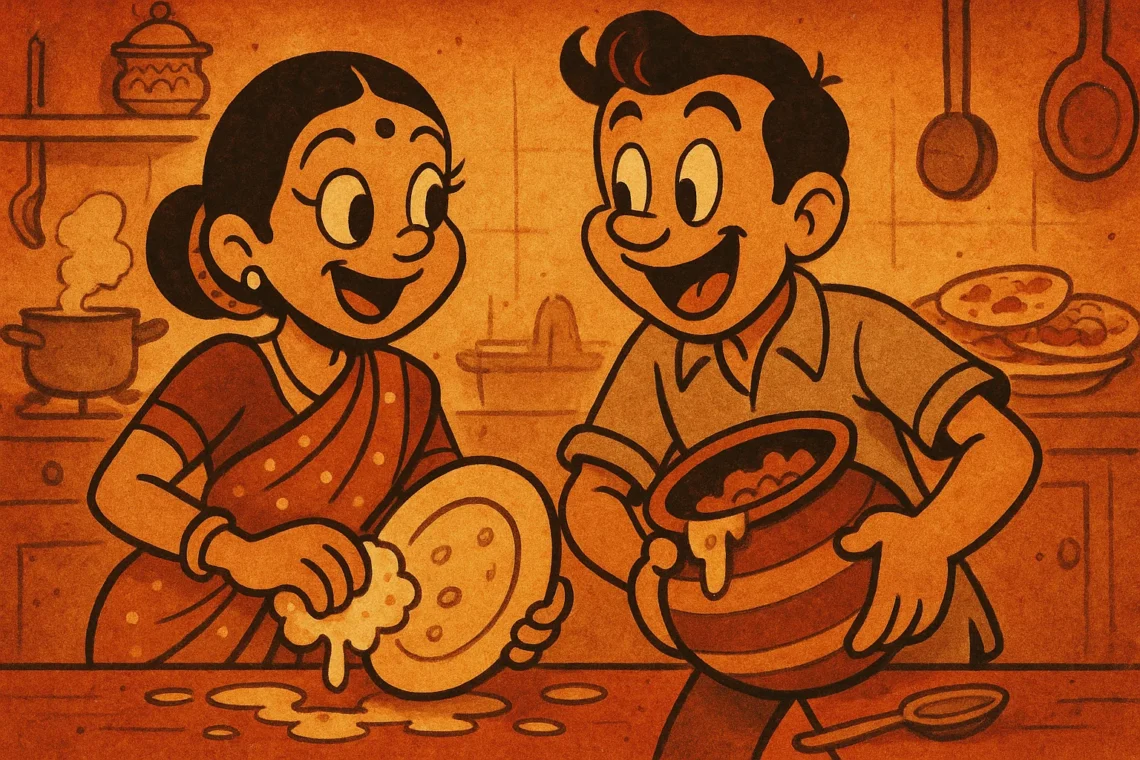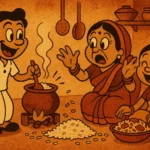For years, cleaning the kitchen after dinner has been one of those tasks I didn’t think too much about. It was simply a necessity—get the dishes done, wipe down the counters, and move on with life. It’s what you do after you’ve enjoyed your meal, right? But somewhere between the hustle of adulthood and the longing for connection to my roots, I’ve come to realize that cleaning up after dinner in an Indian home isn’t just about clearing plates. It’s a small, often overlooked ritual that anchors the day, like the last notes of a song that linger in the air long after it’s over. It’s an essential part of the meal itself—one that gives closure to the eating experience and brings the day to its peaceful end.
Living in Austin now, without the bustle of a big family around the dinner table, I’ve come to reflect on how cleaning the kitchen used to be an unspoken part of the food ritual back home in Mumbai. After finishing dinner with my parents and siblings, there was always that small moment of quiet where we’d gather around the kitchen, clean up, and wind down together. Now, though I often eat alone, I’ve learned that cleaning up isn’t just a chore—it’s a chance to close the chapter of the meal, and in a way, it’s my way of saying goodbye to the day.
The Ritual of Clearing Up
There’s something uniquely grounding about cleaning up after a meal. The kitchen feels different once the last plate is scrubbed and the counters are wiped down. Growing up, I would always help my mother clean after dinner. The routine was simple: scrape off any leftover food from the plates, soak the pots and pans, and carefully wipe the surfaces. It wasn’t a chore we dreaded. It was an act that almost felt ceremonial. The smell of dinner still lingered in the air, mixing with the cleaning supplies as my family settled into the final moments of the evening. The pace of life would slow, and with every dish scrubbed clean, it felt like we were preparing for rest—both physically and mentally.
It was an unspoken time for reflection. The silence in the kitchen as we wiped the counters clean was never awkward, it was just… peaceful. It was like we were giving our home—and ourselves—a chance to rest and reset. After all, the kitchen is where life happens in an Indian household. It’s the heart of the home, and cleaning it feels like giving it the respect it deserves. It’s a final act of appreciation for the meal we just shared, and it signals that we’re done for the day, ready to move on to the quiet of the night. Even the smallest tasks in the kitchen—arranging the dishes in the drying rack or folding up the tea towels—become important, like the final brushstrokes on a canvas.
The Sensory Experience of Cleaning
It’s interesting how cleaning the kitchen can be such a sensory experience. It’s not just about getting the pots and pans in order, it’s about the smells, sounds, and motions that surround you. The faint smell of curry still hanging in the air, the clinking of metal spoons being washed, the hot water running over the dishes—it’s all a part of the sensory choreography of closing the day. In the quiet after dinner, when everyone has moved away from the table, I can almost hear the lingering echoes of the conversation we just had. And as I wash the plates, there’s something deeply comforting about the rhythm of the task. It’s as though I’m physically putting away the remnants of the meal, and with it, the busyness of the day. The act of cleaning transforms the kitchen, making it feel like a new space—ready to be filled again with the energy of tomorrow’s meal.
Cleaning becomes its own form of meditation. It’s not about rushing through it, or getting it over with. It’s about savoring the quiet, about bringing closure to the day. In the process, I reconnect with the food, with the meal, with the tradition of sharing and eating. Even in Austin, without the family around, I find a sense of grounding in this simple ritual. It’s a moment when the chaos of the world outside the kitchen can melt away, if only for a few minutes. And, much like the food itself, cleaning up becomes a part of the comfort of the meal.
The Close of the Day: Food as a Full Circle
In many Indian households, dinner isn’t just a meal—it’s a bonding time, an opportunity for connection after a long day. And the act of cleaning up is just as important as the meal itself. It brings closure to the experience of eating, signaling that the cycle of cooking, eating, and sharing is complete. After we’ve enjoyed our meal, it’s only fitting that we give the kitchen the same attention and care it gave us. In a way, it’s a final thank you to the space where our food came to life.
There’s something about this rhythm that gives structure to the day, a sense of order amid the chaos. Cooking and eating aren’t just about getting food into the body—they’re about the entire flow of the day. They start with the preparation, continue with the enjoyment of the meal, and end with cleaning up. It’s this complete cycle that brings a sense of peace, a sense of accomplishment. Even when the world outside feels overwhelming, the act of tidying up the kitchen allows me to slow down, to reflect, and to reset.
The Practice of Gratitude in Cleaning
In some ways, cleaning the kitchen becomes a moment of gratitude. I’ve come to realize that it’s not just about making sure everything is tidy, but about honoring the process of the meal and the people who shared it. In Mumbai, there was always a feeling of togetherness in the kitchen, even when cleaning up after a family meal. It wasn’t just a task—it was a shared responsibility. Everyone pitched in, no matter how small the task. And that feeling of unity extended into the kitchen, where we would reflect on the meal and the time spent together.
Now, in Austin, I often clean alone, but the same sense of gratitude remains. I think about the food I’ve prepared, the joy it brought me, and the joy it brings to those I cook for. Whether I’m cleaning after a meal I’ve made for myself or sharing it with friends, the act of cleaning feels like a small thank-you. It’s a way of honoring the food, the effort, and the time I’ve spent in the kitchen. In a busy world, it’s these small moments of gratitude that help me feel connected to the food I make, to the memories it carries, and to the traditions I hold dear.
The Quiet Ritual of Cleaning
Cleaning the kitchen after dinner isn’t just a chore; it’s a small but important ritual that completes the cycle of food. It’s a way to honor the meal, the space, and the people you shared it with. It may seem like a mundane task, but in the quiet of the kitchen, it becomes an act of mindfulness, of reflection, and of connection. Whether with family, friends, or just by yourself, cleaning up becomes a way of bringing closure to the day, preparing for what’s next, and grounding yourself in the simple, comforting rhythms of life.
Born in Mumbai, now stir-frying feelings in Texas. Writes about food, memory, and the messy magic in between — mostly to stay hungry, sometimes just to stay sane.












